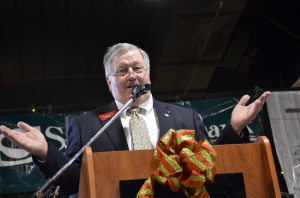Montana Livestock Groups Submit Bison Comments
 Montana Stockgrowers Association, Montana Association of State Grazing Districts and the Montana Public Lands Council, submitted comments regarding the Montana FWP’s DRAFT Environmental Impact Statement Bison Conservation and Management in Montana document. The 90 day comment period closed on September 11th. FWP has stated a record of decision is expected by early next year.
Montana Stockgrowers Association, Montana Association of State Grazing Districts and the Montana Public Lands Council, submitted comments regarding the Montana FWP’s DRAFT Environmental Impact Statement Bison Conservation and Management in Montana document. The 90 day comment period closed on September 11th. FWP has stated a record of decision is expected by early next year.
Our organizations comments were reflective of our membership policies regarding bison management. Some of the general concerns regarding a potential bison relocation included:
- Damages to fences by bison that compromise landowner attempts at good grazing management
- Private property owners expected to bear the brunt of the expenses
- Wild bison would be direct forage competitors with livestock, which would force cattle producers to reduce their herds if bison populations were present on their lands
- Federal and state grazing allotments may be put in jeopardy by the relocation of bison to these lands, negatively affecting Montana’s livestock industry
Our members have clearly stated in our policy that we are opposed to bison relocation, but we are committed to being active participants in future negotiations with all entities involved. Some of our critical concerns to any bison relocation include:
- The use of private lands without the landowner’s permission
- Any relocation must follow strict guidelines:
- No diseased bison will be relocated anywhere in Montana, other than a state and federally approved quarantine facility or a packing plant for immediate processing
- Before any other relocation, DFWP shall develop and adopt a comprehensive statewide management plan that is entirely consistent with 87-1-216, MCA
In reviewing the proposed alternatives, our organizations supported Alternative 1: No Action. In reviewing the entire document, there were numerous concerns regarding a number of sections in the Draft EIS.
Starting with the Genetics section, there appeared to be a recommendation to have a bison population of at least 1,000 animals for genetic purposes. Our comments stated potential herds with these types of population numbers would need extremely large landscapes and nutritional requirements that would lead to significant impacts on neighboring family ranches.
On the section of Brucellosis Management, disease management is one of the livestock industry’s most serious concerns. In the Bison/Agriculture Interactions section, federal grazing permits are referenced. Our organizations have experience with groups seeking to reduce or eliminate these grazing permits to allow more habitat for wildlife. Our concerns stated that many ranchers could be faced with significant legal costs to defend their permits over such challenges.
In the section of Costs to Bison Management, our organizations see some deficiencies it the realization of actual costs to the Department to manage a potential bison population. One of the major concerns among our members is the Department would engage in a restoration project and then have a shortage of funds to adequately run the program. Our organizations also recommend that if a bison proposal moves forward, it be conducted in an area where there is local support.
The Montana Stockgrowers Association, Montana Association of State Grazing Districts and the Montana Public Lands Council will continue to engage in all facets of this decision making process and keep the members informed on any developments.






